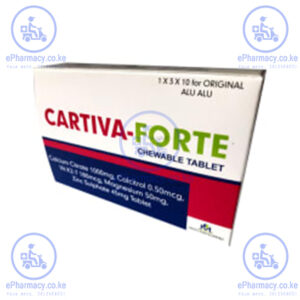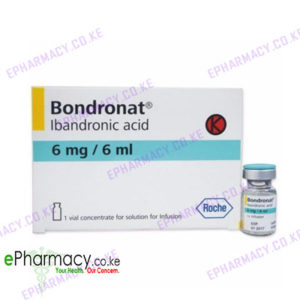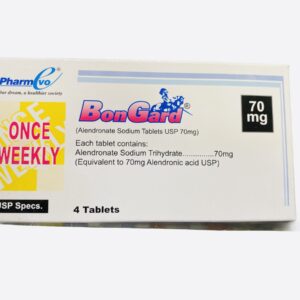Description
Risedronate is an aminobisphosphonate with similar properties to those of the bisphosphonates in general. It inhibits bone resorption and is used as the sodium salt in Paget’s disease of bone and for prevention and treatment of postmenopausal or corticosteroid-induced osteoporosis.
Risedronate sodium (as Gemfos in Kenya) is given by mouth, and the specific instructions for its administration, should be followed to minimise gastrointestinal adverse effects and permit adequate absorption. The recommended dosage for Paget’s disease of bone is 30 mg once daily for 2 months. Treatment may be repeated if necessary after an interval of a further 2 months. The recommended dosage for the treatment or prevention of postmenopausal or corticosteroid-induced osteoporosis is 5 mg daily. Alternatively, for postmenopausal osteoporosis, 35 mg once weekly may be given.
Adverse Effects and Precautions
As for the bisphosphonates in general. The most frequent adverse effects during risedronate therapy in Kenya are arthralgia and gastrointestinal disturbances. To minimise the risk of gastrointestinal effects precautions similar to those for alendronate should be observed, although Kenya licensed information allows for the tablets to be taken other than on rising (but not at bedtime or within 2 hours of food or drink). Hypocalcaemia should be corrected before beginning risedronate therapy.
Effects on the gastrointestinal tract.
Although, like other oral bisphosphonates, it is recommended that risedronate/Gemfos 35mg be taken with care to avoid gastrointestinal effects, pooled analysis of 9 studies involving 10 068 patients receiving risedronate 5 mg daily indicated that the drug was not associated with an increased frequency of upper gastrointestinal effects, even among patients at increased risk due to active gastrointestinal disease or concomitant treatment with aspirin or NSAIDs. However, it was noted that comprehensive postmarketing data will be required to see how these results are reflected in clinical practice.
Pharmacokinetics of Gemfos
Like other bisphosphonates available online in Kenya, risedronate is poorly absorbed after oral administration. Absorption is reduced by food, especially by products containing calcium or other polyvalent cations. The mean bioavailability is 0.63% in the fasting state, and is reduced by 30% when administered 1 hour before breakfast, and by 55% when administered half an hour before breakfast. Unabsorbed drug is eliminated unchanged in the faeces. Risedronate is not metabolised, and 50% of the absorbed dose is excreted unchanged in the urine within 24 hours. The remainder of the absorbed dose is apparently sequestered to bone for a prolonged period.





Reviews
There are no reviews yet.